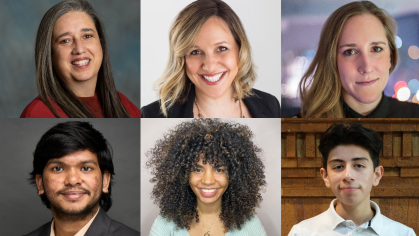The Institute for the Study of Global Racial Justice at Rutgers University has launched two signature Teaching and Research Labs on Race, Social Justice, and the Human: the Race and Gender Equity (RAGE) Lab founded by Brittney Cooper, Professor of Women's, Gender, and Sexuality Studies and Africana Studies at Rutgers-New Brunswick; and The Black Ecologies Lab, led by J.T. Roane (Mellon Assistant Professor of Global Racial Justice, Africana Studies and Geography at Rutgers University-New Brunswick) and Teona Williams (Rutgers Presidential Postdoctoral Fellow in the Department of Geography).
In these multi-modal spaces, scholars, students and faculty investigators pair arts, humanities, and cultural studies research methods with social and behavioral science and stem approaches, producing collaborative, multi-genre, cutting-edge research on race. Each lab aims to contribute innovative research and pedagogy that can lead to the disruption and transformation of racial formations of the human.

The Race and Gender Equity (RAGE Lab) is a multi-modal research incubator committed to producing Black feminist research on the social thriving of Black women and girls and making that research accessible to broad public audiences. As a research and training incubator, RAGE Lab focuses on studying the variety of ways that Black feminists do their work in public. Using a mix of community conversations, digital archiving methods, oral histories of Black feminist thinkers who visit the lab, and textual analysis of Black feminist online knowledge production, researchers in the lab work to ascertain a comprehensive view of the conditions that shape contemporary Black feminist knowledge production.
Plait/Form: A RAGE Lab Black Feminist Public Works Incubator | May 30th – June 1st, 2024
On May 30th, the Race and Gender Equity (RAGE) Lab launched its inaugural Black Feminist Public Works Incubator, Plait/Form, with the generous support of the Ford Foundation, the Mellon Foundation, and the Ms. Foundation for Women. Plait/Form, an intensive summer workshop curated by its Founder and Principal Investigator, Dr. Brittney Cooper, supported the development of public-facing projects by a dynamic cadre of writers, academics, and content creators hailing from locales as far as Colorado, Mississippi, Chicago, and Seattle.
Much like the nightly plaiting practice that has shaped so much of Black communal intimacies, including Black women and girls’ hair care traditions, Plait/Form offered space to intentionally bring together the strands of thinking, teaching, and creating that anchor Black feminist public life. The incubator likewise provided a meeting place for reflecting on the forms that such braiding together of ideas might take.
Learn more about RAGE Lab

The Black Ecologies Lab at the ISGRJ draws together threads in order to generate scholarship, artistry, and other resources that aid in infusing public and scholarly discourse as well as our broader cultural imaginaries with the insights generated through the analytical insights, methods, and theories related to Black Ecologies and its closely allied fields, including Black Geographies. The lab provides a suite of digital projects, speaker series and workshops, community engagement events, teaching and undergraduate program development, and publications to foment Rutgers as a major center for Black ecological studies for faculty, students, and community.
The Black Ecologies field school in New Orleans, LA (Summer 2024)
Black Ecologies Lab board member Dr. Justin Hosbey (UC Berkeley) will convene the second Black ecologies field school in New Orleans in summer, 2024, organized around the themes of educational infrastructure in the post-Katrina context, historical and contemporary forms of marronage, waterscapes, and carceral ecologies.
This second field school will bring together community partners in the Lower 9th Ward, Algiers, and Plaquemines Parish, with a visit to the Leona Tate Center and Solitary Gardens. At the conclusion of the field school, the Black Ecologies Lab will develop the second iteration of the Black Ecologies Zine with methodological, historical, artistic, and other analyses of collective experiences in Louisiana.
Learn more about The Black Ecologies Lab



